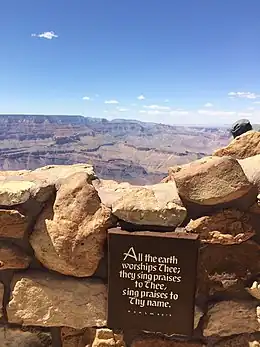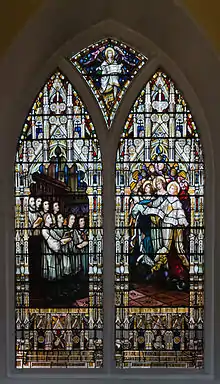Psalm 66
Psalm 66 is the 66th psalm of the Book of Psalms, beginning in English in the King James Version: "Make a joyful noise unto God, all ye lands". In the slightly different numbering system of the Greek Septuagint version of the Bible and the Latin Vulgate, this psalm is Psalm 65. In Latin, it is known as "Iubilate Deo omnis terra".[1][2] It is a psalm of thanksgiving probably intended for use at the Passover.[3][4] The psalm is divided into two parts: in verses 1-12 the community praises God and invites the whole world to join in praise; in verses 13–20, "an individual from the rescued community fulfils a vow to offer a sacrifice of thanksgiving".[5]
| Psalm 66 | |
|---|---|
| "Make a joyful noise unto God, all ye lands" | |
 Psalm 66:4 at the Grand Canyon, Arizona | |
| Other name |
|
| Language | Hebrew (original) |
| Psalm 66 | |
|---|---|
← Psalm 65 Psalm 67 → | |
| Book | Book of Psalms |
| Hebrew Bible part | Ketuvim |
| Order in the Hebrew part | 1 |
| Category | Sifrei Emet |
| Christian Bible part | Old Testament |
| Order in the Christian part | 19 |
The psalm forms a regular part of Jewish, Catholic, Lutheran, Anglican and other Protestant liturgies. It has been set to music.
Text
King James Version
- Make a joyful noise unto God, all ye lands:
- Sing forth the honour of his name: make his praise glorious.
- Say unto God, How terrible art thou in thy works! through the greatness of thy power shall thine enemies submit themselves unto thee.
- All the earth shall worship thee, and shall sing unto thee; they shall sing to thy name. Selah.
- Come and see the works of God: he is terrible in his doing toward the children of men.
- He turned the sea into dry land: they went through the flood on foot: there did we rejoice in him.
- He ruleth by his power for ever; his eyes behold the nations: let not the rebellious exalt themselves. Selah.
- O bless our God, ye people, and make the voice of his praise to be heard:
- Which holdeth our soul in life, and suffereth not our feet to be moved.
- For thou, O God, hast proved us: thou hast tried us, as silver is tried.
- Thou broughtest us into the net; thou laidst affliction upon our loins.
- Thou hast caused men to ride over our heads; we went through fire and through water: but thou broughtest us out into a wealthy place.
- I will go into thy house with burnt offerings: I will pay thee my vows,
- Which my lips have uttered, and my mouth hath spoken, when I was in trouble.
- I will offer unto thee burnt sacrifices of fatlings, with the incense of rams; I will offer bullocks with goats. Selah.
- Come and hear, all ye that fear God, and I will declare what he hath done for my soul.
- I cried unto him with my mouth, and he was extolled with my tongue.
- If I regard iniquity in my heart, the Lord will not hear me:
- But verily God hath heard me; he hath attended to the voice of my prayer.
- Blessed be God, which hath not turned away my prayer, nor his mercy from me.
Uses
Judaism
Book of Common Prayer
In the Church of England's Book of Common Prayer, this psalm is appointed to be read on the evening of the 12th day of the month.[8]
History
[Come and see] "what God hath wrought" was the first message sent by telegraph in 1844. The verse was suggested by Annie Ellsworth and inspired by Psalm 66:5 and Psalm 66:16. Standing in the chamber of the Supreme Court, Samuel B. Morse sent a 19-letter message to his assistant Albert Vail in Baltimore, who transmitted the message back.[9] Psalm 66:5 was sent as "come and see what God has done" while Psalm 66:16 was the reply: "Come and see what God has done for me".
Music
Heinrich Schütz set Psalm 66 in a metred version in German, "Jauchzet Gott, alle Lande sehr", SWV 163, as part of the Becker Psalter, first published in 1628.
References
- Parallel Latin/English Psalter / Psalmus 65 (66) Archived 7 May 2017 at the Wayback Machine medievalist.net
- "Comparison of Enumeration of the Psalms in the Book of Divine Worship and in the Vulgate". The Daily Office of the Catholic Church According to the Anglican Use. Retrieved 7 November 2018.
- The Artscroll Tehillim, page 329
- Kirkpatrick, A. (1906), Cambridge Bible for Schools and Colleges on Psalm 66, accessed 8 December 2021
- Confraternity of Christian Doctrine, Inc., Footnote a at Psalm 66 in the New American Bible Revised Edition
- Lawrence, David. "Gloine – Stained glass in the Church of Ireland". Archived from the original on 10 October 2018. Retrieved 9 October 2018.
- The Complete Artscroll Siddur, page 263
- Church of England, Book of Common Prayer: The Psalter as printed by John Baskerville in 1762, pp. 196ff
- Madrigal, A. C.,The First Long-Distance Telegraph Message, Sent This Day in 1844: 'What Hath God Wrought?', published 24 May 2013
External links
- Pieces with text from Psalm 66: Scores at the International Music Score Library Project
- Psalm 66: Free scores at the Choral Public Domain Library (ChoralWiki)
- Psalm 66 in Hebrew and English - Mechon-mamre
- Text of Psalm 66 according to the 1928 Psalter
- For the leader. A song; a psalm. Shout joyfully to God, all the earth; sing of his glorious name text and footnotes, usccb.org United States Conference of Catholic Bishops
- Psalm 66 – How Everyone Can Praise God text and detailed commentary, enduringword.com
- Psalm 66:1 introduction and text, biblestudytools.com
- Psalm 66 / Refrain: All the earth shall worship you, O Lord. Church of England
- Psalm 66 at biblegateway.com
- Hymns for Psalm 66 hymnary.org
- Psalm 66 in the Revised Grail Psalter
